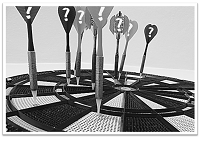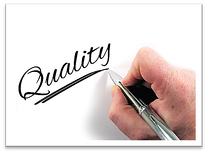 What is the difference between a stall and an objection? A stall is, "I want to think about it," or "I have to meet with other people." An objection is, "Your price is too high," or "We have a satisfactory supply." Both are putoffs which basically say, "You haven't sold me yet." The bottom line is conversion. You have to convert their lack of confidence, their lack of trust, and their lack of perceived value into a sale.
What is the difference between a stall and an objection? A stall is, "I want to think about it," or "I have to meet with other people." An objection is, "Your price is too high," or "We have a satisfactory supply." Both are putoffs which basically say, "You haven't sold me yet." The bottom line is conversion. You have to convert their lack of confidence, their lack of trust, and their lack of perceived value into a sale.
- Jeffrey Gitomer, The Little Red Book of Sales Answers


 Even if you need very specific information... a good strategy is to start with a few open-ended questions and become more focused as you go. This gives you the opportunity to develop a rapport with the other person while at the same time getting some valuable background data. It just takes a little patience, which is essential anyway if you want to get honest, reliable information.
Even if you need very specific information... a good strategy is to start with a few open-ended questions and become more focused as you go. This gives you the opportunity to develop a rapport with the other person while at the same time getting some valuable background data. It just takes a little patience, which is essential anyway if you want to get honest, reliable information. The surest way to grab a sale is to make a great impression from start to finish. To ensure you get it right through and through, if you simply follow our "5 Simple Steps for Sales Calls," you will have a head start on reaching the sales finish line. Then, if you incorporate some intuitive skills, like positive energy, an engaging personality, and a genuine desire to discover and meet the customer's needs, your customer will always want to buy from you.
The surest way to grab a sale is to make a great impression from start to finish. To ensure you get it right through and through, if you simply follow our "5 Simple Steps for Sales Calls," you will have a head start on reaching the sales finish line. Then, if you incorporate some intuitive skills, like positive energy, an engaging personality, and a genuine desire to discover and meet the customer's needs, your customer will always want to buy from you.  Great service organizations know how to read their customers and respond.
Great service organizations know how to read their customers and respond. In many service businesses, the industry—not the client—defines quality. In advertising, when most creative people say, "That's a really good ad," they don't mean that the ad might build the client's business. They just mean that it has a good headline, good visual—it's good. Neat. Cool. Many architects treasure buildings that are enormously inconvenient for the people who work inside. Still, architects call them great buildings. Ask: Who is setting your standards—your industry, your ego, or your clients?
In many service businesses, the industry—not the client—defines quality. In advertising, when most creative people say, "That's a really good ad," they don't mean that the ad might build the client's business. They just mean that it has a good headline, good visual—it's good. Neat. Cool. Many architects treasure buildings that are enormously inconvenient for the people who work inside. Still, architects call them great buildings. Ask: Who is setting your standards—your industry, your ego, or your clients?